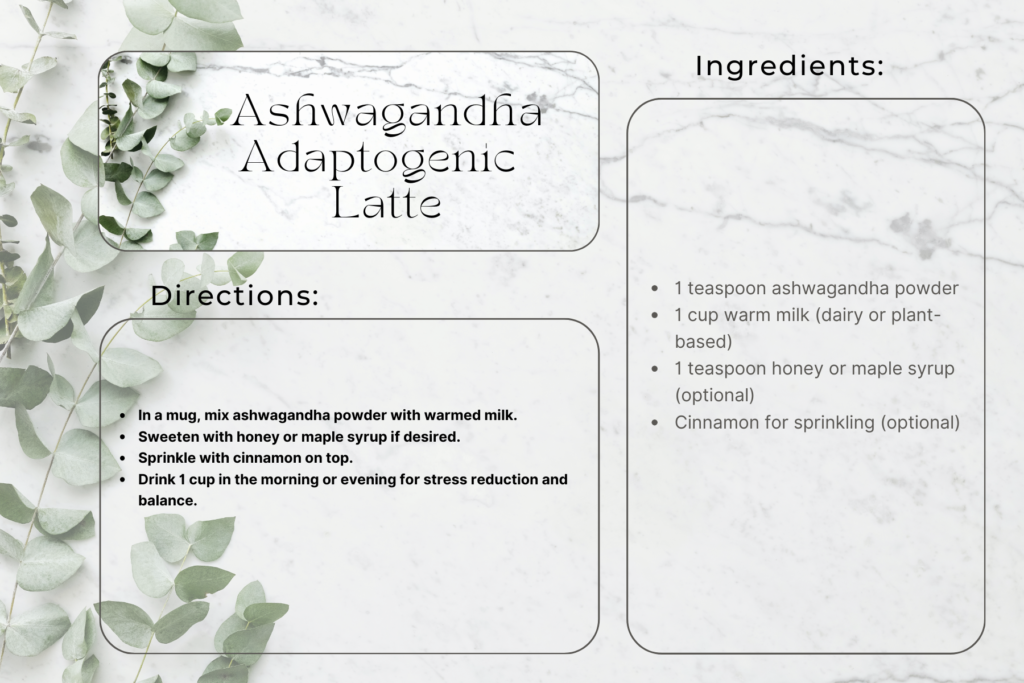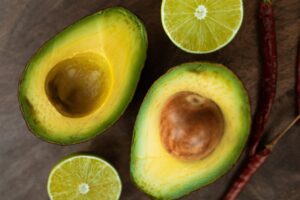Serenity in Sips
Sip on serenity with our Ashwagandha Adaptogenic Latte, a soothing elixir crafted to reduce stress and promote balance, whether you’re managing daily challenges or simply seeking a calming indulgence.
Ashwagandha, known as “Indian ginseng,” has a rich history in Ayurvedic medicine, celebrated for its adaptogenic properties.
This latte blends this herbal gem with the benefits of honey, cinnamon and Ceylon cinnamon to create a harmonious concoction for your well-being.
Ashwagandha Adaptogenic Latte
Ashwagandha Adaptogenic Latte
Ingredients:
- 1 teaspoon ashwagandha powder
- 1 cup warm milk (dairy or plant-based)
- 1 teaspoon honey or maple syrup (optional)
- Cinnamon for sprinkling (optional)
Instructions:
- In a mug, mix ashwagandha powder with warmed milk.
- Sweeten with honey or maple syrup if desired.
- Sprinkle with cinnamon on top.
- Drink 1 cup in the morning or evening for stress reduction and balance.
Behind The Ingedients
The History of Ashwagandha
Ashwagandha (Withania somnifera) is an herb that has been used for centuries in traditional Ayurvedic medicine, which originated in India. It is also known as “Indian ginseng” or “winter cherry.” The root and berries of the ashwagandha plant are primarily used for their medicinal properties. In Ayurvedic tradition, ashwagandha is classified as a “rasayana,” which refers to herbs that are believed to promote longevity, enhance overall health and improve vitality.
Ashwagandha contains a variety of bioactive compounds, including alkaloids, steroidal lactones (withanolides), and flavonoids, which are thought to contribute to its health benefits. Some of the potential medicinal effects of ashwagandha include:
- Stress and Anxiety Reduction: Ashwagandha is considered an adaptogen, a substance that may help the body adapt to stress and promote balance. It is thought to modulate the body’s stress response by reducing cortisol levels.
- Cognitive Function: Ashwagandha may have neuroprotective properties that could benefit cognitive function. Some studies suggest it might enhance memory and cognitive performance.
- Anti-Inflammatory Effects: Ashwagandha has been studied for its potential anti-inflammatory properties, which could be beneficial for various health conditions including mental dysregulations.
- Mood Regulation: Some research suggests that ashwagandha might have mood-stabilizing effects, which could be valuable for individuals with mood disorders.

The Benefits of Honey
Pure, raw honey is a natural sweetener that has been used for centuries in various cultures for its potential health benefits. While it’s important to note that scientific research on the specific effects of raw honey for mental dysregulations is limited, there are several general benefits of honey for the human body and brain that could indirectly support overall well-being, including mental health:
1. Nutrient Content: Raw honey contains a variety of vitamins, minerals, and antioxidants that can contribute to overall health. These nutrients can support brain function and overall bodily processes.
2. Antioxidant Properties: Antioxidants found in honey, such as flavonoids and phenolic compounds, can help protect cells from oxidative stress and inflammation. Oxidative stress has been linked to various mental health conditions, so reducing it could potentially have positive effects on mental well-being.
3. Natural Energy Source: The natural sugars in honey, primarily glucose and fructose, can provide a quick source of energy for the body and brain. Stable blood sugar levels are important for maintaining consistent energy levels and mood stability.
4. Anti-Inflammatory Effects: Chronic inflammation has been associated with various mental health disorders. Honey’s anti-inflammatory properties might help mitigate inflammation in the body and potentially contribute to better mental health.
5. Gut Health: There is a growing body of research linking gut health to mental health. Raw honey contains prebiotic compounds that can support the growth of beneficial gut bacteria, potentially influencing brain health through the gut-brain axis.
6. Sleep Aid: Good sleep is essential for mental well-being. Honey can aid in improving sleep quality due to its natural content of amino acids, such as tryptophan, which can help promote relaxation and the production of the sleep-regulating hormone melatonin.
7. Mood Regulation: Honey contains natural sugars that can stimulate the release of serotonin, a neurotransmitter associated with mood regulation. Balanced serotonin levels are important for managing mood disorders.
8. Brain Health: Some studies suggest that honey might have neuroprotective effects, which could potentially support brain health and cognitive function.
Important Considerations:
- Moderation: While honey offers potential benefits, it’s important to consume it in moderation due to its sugar content.
- Quality: Choose high-quality, raw, and unprocessed honey to ensure you’re getting the full range of nutrients and antioxidants.
- Individual Variability: The impact of honey on mental health can vary from person to person, and it’s not a standalone treatment for mental dysregulations.
- Professional Guidance: If you have mental health concerns or are considering dietary changes, it’s crucial to consult with healthcare professionals. Diet is just one aspect of managing mental health, and a comprehensive treatment plan may involve various approaches.
In summary, while raw honey has potential health benefits that could indirectly support mental well-being, it’s important to approach it as part of a holistic approach to mental health, including proper medical care, therapy and lifestyle adjustments.

The Benefits of Ceylon Cinnamon
Ceylon cinnamon, also known as “true cinnamon,” is a type of cinnamon derived from the Cinnamomum verum plant. It is distinct from the more common variety known as cassia cinnamon. While scientific research specifically focusing on the effects of Ceylon cinnamon on mental dysregulations is limited, there are several general benefits of Ceylon cinnamon for the human body and brain that could indirectly support overall well-being, including mental health:
1. Anti-Inflammatory Properties: Chronic inflammation has been linked to various mental health conditions, including depression and anxiety. Ceylon cinnamon contains compounds with anti-inflammatory effects that might help reduce overall inflammation in the body, potentially benefiting mental health.
2. Antioxidant Content: Ceylon cinnamon is rich in antioxidants, such as polyphenols and flavonoids, which can help protect cells from oxidative stress. Oxidative stress has been implicated in neurodegenerative disorders and cognitive decline.
3. Blood Sugar Regulation: Maintaining stable blood sugar levels is important for mood stability and cognitive function. Ceylon cinnamon has been studied for its potential to improve insulin sensitivity and lower blood sugar levels, which could indirectly support mental well-being.
4. Cognitive Function: Some animal studies suggest that cinnamon extract might have positive effects on cognitive function, memory, and learning. While more research is needed to confirm these effects in humans, the potential cognitive benefits of Ceylon cinnamon could indirectly contribute to mental well-being.
5. Mood Regulation: There is some evidence to suggest that cinnamon might influence serotonin and dopamine levels, neurotransmitters that play a role in mood regulation. Balanced neurotransmitter levels are important for managing mood disorders.
6. Neuroprotective Effects: Certain compounds in Ceylon cinnamon, such as cinnamaldehyde, have been studied for their potential neuroprotective effects. These effects could be relevant to maintaining brain health and reducing the risk of neurodegenerative disorders.
7. Gut Health: Emerging research highlights the gut-brain connection, where gut health can impact mental well-being. Ceylon cinnamon may support gut health by promoting the growth of beneficial gut bacteria.
8. Relaxation: The aroma of cinnamon has been associated with relaxation and stress reduction. Inhaling the scent of cinnamon might have a calming effect on the brain.
Important Considerations:
Quality: Choose high-quality Ceylon cinnamon to ensure you’re getting the genuine product and its potential benefits. Cassia cinnamon, the more common variety, contains higher levels of coumarin, which can be harmful in large amounts.
Dosage: If you’re considering using Ceylon cinnamon for potential benefits, it’s important to use it in moderation and follow recommended dosage guidelines.
Note: If you have mental health concerns, it’s crucial to consult with healthcare professionals. Cinnamon, like other natural remedies, should be seen as a complementary approach rather than a substitute for professional treatment.
In summary, while Ceylon cinnamon offers potential health benefits that could indirectly support mental well-being, it’s important to incorporate it as part of a comprehensive approach to mental health that includes proper medical care, therapy and lifestyle adjustments.
Disclaimer: The information and/or products mentioned in this article are provided as information resources only and are not to be used or relied on to diagnose, treat, cure or prevent any disease. The statements made in this article have not been evaluated by the Food and Drug Administration. Any products mentioned are not intended to diagnose, treat, cure, or prevent any disease, but rather to be considered as an informational resource only to encourage critical thinking and personal research. The information in this article is intended for educational purposes only. The information is not intended to replace medical advice offered by licensed medical physicians. Please consult your doctor or health care practitioner for any and all medical advice.





